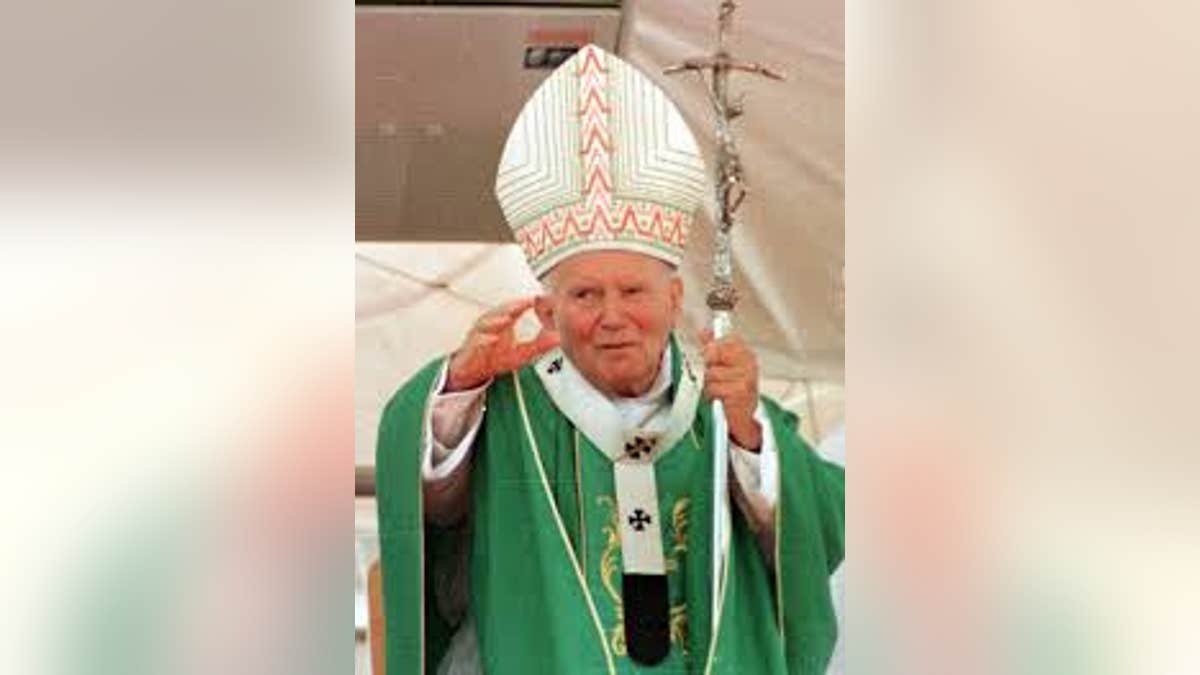
1920: Karol Wojtyla is born May 18 in Wadowice, Poland.
He is baptized June 20.
1929: His mother dies; later this year, he receives first Communion.
1938: Moves to Krakow with his father, and enters Jagellonian University, where he joins a theater group.
1940: Forced to leave university; takes job as manual laborer
during World War II.
1941: His father dies.
1942: Enters secret seminary in Krakow.
1944: hospitalized after being hit by a car. He is later hidden in archbishop's home to avoid arrest by Nazis.
1945: World War II ends; he resumes studies at Jagellonian University.
1946: Ordained priest on Nov. 1; begins graduate studies in Rome.
1958: Ordained auxiliary bishop of Krakow on Sept. 28.
1962: Goes to Rome for first session of Second Vatican Council.
1963: Attends Vatican II second session, is named archbishop
of Krakow Dec. 30.
1965: Travels to Rome three times to help re-draft Vatican II document on church in modern world.
1967: Becomes a cardinal on June 28; named to first world Synod of Bishops, but stays home to protest government's denial of a passport to Poland's primate, Cardinal Stefan Wyszynski.
1978: Elected 264th pope and bishop of Rome on Oct. 16; visits Assisi, the first of 146 trips within Italy.
1979: Visits Dominican Republic and Mexico, in what are the first of his 104 trips abroad as pope; also visits Poland, Ireland, United States and Turkey; convenes first plenary meeting of College of Cardinals in more than 400 years; approves Vatican declaration that Swiss-born Father Hans Kung can no longer teach as Catholic theologian.
1981: Shot, severely wounded on May 13; names Cardinal Joseph Ratzinger head of Vatican doctrinal congregation.
1982: Marks anniversary of attempt on his life with trip to Fatima, Portugal; meets with Palestinian leader Yasser Arafat; makes Opus Dei the church's first personal prelature.
1983: Opens Holy Year of Redemption; visits would-be assassin, Mehmet Ali Agca, in prison.
1984: Establishes diplomatic relations with United States.
1986: Makes historic visit to Rome's synagogue; calls world religious leaders to Assisi to pray for peace.
1992: Benign tumor on colon is removed; issues official "Catechism of the Catholic Church."
1993: Writes first papal encyclical on nature of moral theology.
1994: Declares teaching that women cannot be priests must be held definitively; establishes diplomatic relations with Israel; named Time magazine's "Man of the Year."
1998: Historic Cuba visit is 81st trip abroad; starts first permanent Catholic-Muslim dialogue.
2000: Presides at numerous jubilee year events in Rome; makes historic visit to Holy Land.
2003: Marks 25th anniversary as pope; beatifies Mother Teresa of Calcutta, one of a record number of beatifications and canonizations under his pontificate.
2005: Publishes new book, "Memory and Identity: Conversations Between Millenniums"; is hospitalized, and undergoes tracheotomy. Dies April 2.
Source: The United States Conference of Catholic Bishops







































